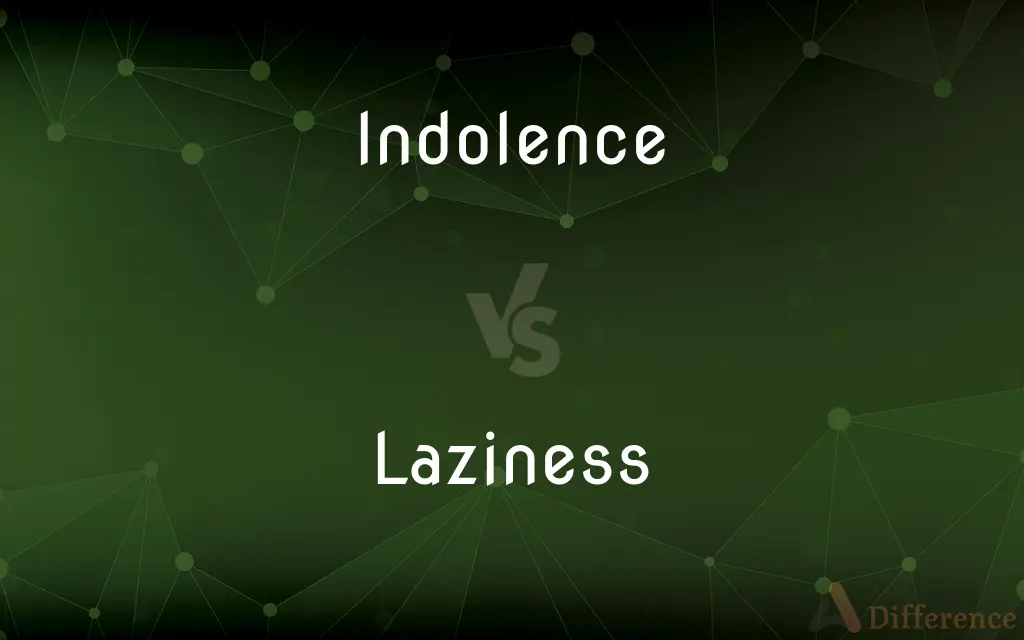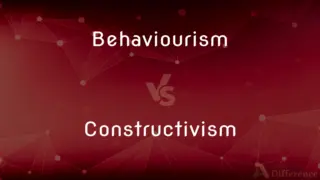Indolence vs. Laziness — What's the Difference?
Edited by Tayyaba Rehman — By Maham Liaqat — Updated on April 21, 2024
Indolence implies a love of ease and aversion to activity, often seen as a temperament trait; laziness suggests an unwillingness to exert effort.

Difference Between Indolence and Laziness
Table of Contents
ADVERTISEMENT
Key Differences
Indolence often refers to a habitual love of ease and a natural tendency to avoid exertion. While laziness is generally characterized as a lack of motivation to perform necessary tasks, sometimes resulting from a temporary state or mood.
Indolence might be seen in a person’s overall demeanor and approach to various aspects of life, whereas laziness can be specific to certain tasks or situations.
People described as indolent typically show a continuous preference for relaxation and minimal activity, whereas those described as lazy might actively avoid responsibilities or exerting themselves.
Indolence can sometimes be viewed more neutrally, as part of someone’s character, while laziness often carries a negative connotation, implying a fault or shortcoming.
Indolence may also be linked with a more philosophical or deliberate choice to prioritize leisure and ease, on the other hand, laziness is frequently associated with procrastination and poor time management.
ADVERTISEMENT
Comparison Chart
Definition
A habitual love of ease; aversion to activity.
A lack of desire to exert effort.
Connotation
Often neutral, can be seen as a temperament.
Generally negative, implies a personal fault.
Relation to Activity
Tendency towards minimal activity consistently.
Avoidance of effort in specific situations.
Perception in Society
Sometimes acceptable or philosophical.
Often viewed negatively.
Associated Behavior
Consistent preference for relaxation.
Task-specific avoidance and procrastination.
Compare with Definitions
Indolence
A disposition to avoid exertion; love of ease.
His indolence was evident in his approach to all chores.
Laziness
The quality of being unwilling to work or use energy.
Laziness kept him from achieving his potential.
Indolence
Natural inertia towards activity.
His indolence seemed ingrained and unchangeable.
Laziness
An aversion to activity due to lack of motivation.
Laziness, not incompetence, affected his performance.
Indolence
A state of being habitually lazy.
The indolence he displayed over summer worried his parents.
Laziness
Temporary unwillingness to engage in physical or mental exertion.
His laziness on weekends was legendary.
Indolence
A philosophical choice to minimize personal exertion.
He justified his indolence by quoting philosophers.
Laziness
Habit of putting off tasks.
Laziness led to a pile of unwashed dishes.
Indolence
A relaxed, easy-going attitude to life.
Her indolence made her popular at the laid-back resort.
Laziness
Tendency to choose easier tasks over challenging ones.
Laziness influenced her decision to avoid advanced courses.
Indolence
Habitual laziness; sloth.
Laziness
Laziness (also known as indolence) is disinclination to activity or exertion despite having the ability to act or to exert oneself. It is often used as a pejorative; terms for a person seen to be lazy include "couch potato", "slacker", and "bludger".
Indolence
Habitual laziness or sloth.
Laziness
Not willing to work or be energetic.
Indolence
(pathology) Lack of pain in a tumour.
Laziness
Slow-moving; sluggish
A lazy river.
Indolence
(obsolete) A state in which one feels no pain or is indifferent to it; a lack of any feeling.
Laziness
Conducive to inactivity or indolence
A lazy summer day.
Indolence
(obsolete) A state of repose in which neither pain nor pleasure is experienced.
Laziness
Depicted as reclining or lying on its side. Used of a brand on livestock.
Indolence
Freedom from that which pains, or harasses, as toil, care, grief, etc.
I have ease, if it may not rather be called indolence.
Laziness
The quality of being lazy
Indolence
The quality or condition of being indolent; inaction, or lack of exertion of body or mind, proceeding from love of ease or aversion to toil; habitual idleness; indisposition to labor; laziness; sloth; inactivity.
Life spent in indolence, and therefore sad.
As there is a great truth wrapped up in "diligence," what a lie, on the other hand, lurks at the root of our present use of the word "indolence"! This is from "in" and "doleo," not to grieve; and indolence is thus a state in which we have no grief or pain; so that the word, as we now employ it, seems to affirm that indulgence in sloth and ease is that which would constitute for us the absence of all pain.
Laziness
The state or quality of being lazy.
Laziness travels so slowly, that Poverty soon overtakes him.
Indolence
Inactivity resulting from a dislike of work
Laziness
Inactivity resulting from a dislike of work
Laziness
Apathy and inactivity in the practice of virtue (personified as one of the deadly sins)
Common Curiosities
What is the main difference between indolence and laziness?
Indolence is a more permanent trait focused on a love of ease, whereas laziness refers to an occasional lack of motivation to exert effort.
Can someone be both indolent and lazy?
Yes, indolence can encompass general laziness, but someone can also be lazy in specific situations without an overall indolent temperament.
How does society view indolence compared to laziness?
Society may accept indolence as part of an individual’s character, but laziness is typically frowned upon as it affects productivity.
Is indolence related to physical health?
Indolence can be influenced by physical health but is more commonly associated with temperament.
Is indolence always a negative trait?
Not necessarily, as it can be viewed as a personal preference for a relaxed lifestyle, whereas laziness is more often seen negatively.
How can one overcome laziness?
Overcoming laziness typically involves setting clear goals, creating structured schedules, and finding motivation.
Can laziness be a temporary condition?
Yes, laziness can be situational or temporary, often influenced by mood or specific circumstances.
Can cultural factors influence perceptions of indolence and laziness?
Cultural values and work ethics significantly influence how indolence and laziness are perceived and tolerated.
Does indolence affect professional life?
Yes, indolence can affect professional life by limiting one’s willingness to engage in more vigorous or challenging activities.
Are there any positive aspects of laziness?
Occasionally, laziness can lead to efficient problem-solving as individuals may find the easiest way to complete tasks.
Share Your Discovery

Previous Comparison
Fey vs. Wey
Next Comparison
Cradle vs. GondolaAuthor Spotlight
Written by
Maham LiaqatEdited by
Tayyaba RehmanTayyaba Rehman is a distinguished writer, currently serving as a primary contributor to askdifference.com. As a researcher in semantics and etymology, Tayyaba's passion for the complexity of languages and their distinctions has found a perfect home on the platform. Tayyaba delves into the intricacies of language, distinguishing between commonly confused words and phrases, thereby providing clarity for readers worldwide.















































